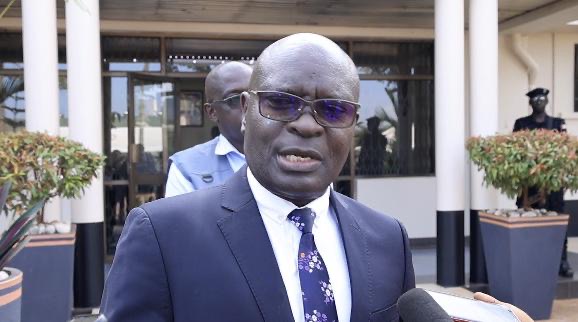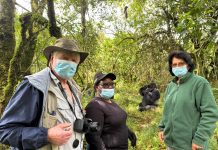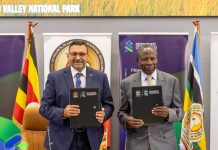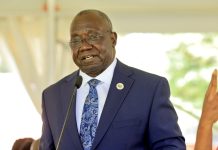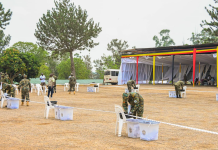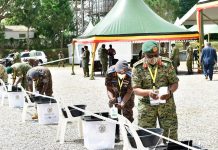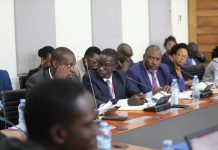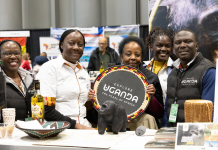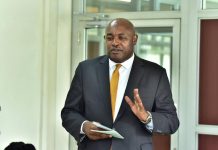By David Mwanje
Justice Simon Byabakama, head of the Electoral Commission, announced yesterday that 30 presidential hopefuls have turned in their required supporter signatures, setting the stage for nominations later this month. This milestone comes as Uganda gears up for the January 2026 general elections, with the commission now racing to validate submissions amid tight deadlines.
In a media briefing at the EC headquarters in Kampala’s Industrial Area, Byabakama outlined the legal hurdles candidates must clear. Under the Presidential Elections Act, each contender needs endorsements from at least 100 registered voters in no fewer than 98 districts nationwide, totaling a minimum of 9,800 signatures. The EC’s role is to scrutinize these lists rigorously, confirming that every signer is a verified voter in their listed district and hasn’t backed multiple candidates.
“Verification involves matching names, signatures, and voter records,” Byabakama stated. “If everything checks out, we grant a compliance certificate, paving the way for nomination fees and official clearance.” He stressed the importance of scheduling nomination slots on September 23 or 24 to prevent last-minute rushes at the new EC offices in Lweza, Entebbe.
Among the 30 who met the deadline are several familiar faces from the 2021 elections, where 11 candidates vied for the top job. Incumbent President Yoweri Museveni, 80, of the National Resistance Movement (NRM), submitted over 2.2 million signatures last Friday, far exceeding requirements after his party’s primaries endorsed him for a potential seventh term.
Opposition leader Robert Kyagulanyi, known as Bobi Wine of the National Unity Platform (NUP), also filed his forms. The musician-turned-politician, who garnered 35 percent in 2021, has vowed to challenge Museveni again despite facing arrests and threats. “If I’m alive and not in jail, I’ll run to fight for change,” he said earlier this year.
Other returning contenders include Forum for Democratic Change (FDC) Secretary General Nathan Nandala Mafabi, leads his party’s bid. Uganda People’s Congress (UPC) President Jimmy Akena, son of the party’s founder, submitted signatures backing his run. Independent Joseph Kabuleta, a journalist and pastor filed through his National Economic Empowerment Dialogue (NEED) party, despite internal wrangling.
Young firebrand John Katumba, 28, who made history as Uganda’s youngest candidate in 2021 at age 24, resubmitted his forms. His youthful energy drew global notice last cycle, and he’s back as an independent. Rounding out notables are Democratic Party (DP) hopeful Norbert Mao, though party disputes over flag-bearers continue, and Uganda Federal Alliance’s Peter Walubengo Mayanja, a perennial contender.
Byabakama praised the early birds but urged the remaining 180 plus aspirants from the initial 220 who picked forms in August to hurry. “We opened submissions on August 11 plenty of time for dedicated candidates to gather support. Don’t wait; verification takes time,” he advised. Slots are filling fast, and late entries risk disqualification.
Early checks have uncovered slip-ups, including endorsements from minors as young as 13 and voters mismatched to wrong districts. “These errors could sink a campaign,” Byabakama cautioned. “Aspirants, double-check your lists to avoid pitfalls.” The commission has flagged about a dozen such cases so far, emphasizing that supporters must be adults and loyal to one candidate only.
Beyond the presidential push, the EC is tackling a backlog of nearly 100 petitions from recent local polls. About 30 hearings are done, with the rest ongoing. “We hear everyone petitioners, respondents, even returning officers,” Byabakama said. If evidence shows wrongful exclusions, the law lets the EC reinstate candidates, ensuring equity at every level.
The commission is also mediating party infighting. Hearings involve DP, UPC, and NEED, where rival factions battle for control of presidential slots. “We’re determining authentic representatives to keep the process fair,” Byabakama noted. These disputes echo broader tensions, but he affirmed the EC’s neutrality.
Byabakama reiterated the body’s pledge to openness. “Transparency is our cornerstone. We’ll deliver a credible 2026 poll for all Ugandans.” With fees due post certification and campaigns kicking off in October, the race is heating up. Only verified contenders will hit the trail, but the field promises fierce debate on jobs, rights, and reform.


